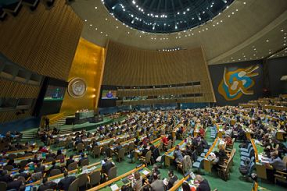Series – Part I
Understanding the “United Nations Conference on International Commercial Arbitration” and the “Convention on the Recognition and Enforcement of Foreign Arbitral Awards” in the context of External Trade Disputes
Introduction
 Credit The UN International Trade Law Division
Credit The UN International Trade Law Division
Initially the United Nations Commission on International Trade Law (UNCITRAL) was established by the UN General Assembly on December 17th, 1966 to unify international trade law as a tool aimed at encouraging the globalization of international trade and free flow of goods. It was concluded that different legal and judicial systems prevailing in UN member states remain a significant hurdle in expansion of world trade. The United Nations Convention on the Recognition and Enforcement of Foreign Arbitral Awards ,also known as the New York Convention, has been adopted by the United Nations General Assembly.
 Credit UN Commission on New York Convention
Credit UN Commission on New York Convention
Salient Features
The United Nations Convention on the Recognition and Enforcement of Foreign Arbitral Awards (referred to as Convention) comprises of 16 Articles.Salient features are elaborated ,as under:
- This Convention shall apply to the recognition and enforcement of arbitral awards made in the territory of a State other than the State where the recognition and enforcement of such awards are sought, and arising out of differences between persons, whether physical or legal. It shall also apply to arbitral awards not considered as domestic awards in the State where their recognition and enforcement are sought.
- The term “arbitral awards” shall include not only awards made by arbitrators appointed for each case but also those made by permanent arbitral bodies to which the parties have submitted.
- Each Contracting State shall recognize an agreement in writing under which the parties undertake to submit to arbitration all or any differences which have arisen or which may arise between them in respect of a defined legal relationship, whether contractual or not, concerning a subject matter capable of settlement by arbitration.
- The term “agreement in writing” shall include an arbitral clause in a contract or an arbitration agreement, signed by the parties or contained in an exchange of letters or telegrams.
- Each Contracting State shall recognize arbitral awards as binding and enforce them in accordance with the rules of procedure of the territory where the award is relied upon.
- To obtain the recognition and enforcement mentioned in the preceding article, the party applying for recognition and enforcement shall, at the time of the application, supply:
- The duly authenticated original award or a duly certified copy thereof;
- The original agreement referred to in article II or a duly certified copy thereof
- The provisions of the present Convention shall not affect the validity of multilateral or bilateral agreements concerning the recognition and enforcement of arbitral awards entered into by the Contracting States nor deprive any interested party of any right he may have to avail himself of an arbitral award in the manner and to the extent allowed by the law or the treaties of the country where such award is sought to be relied upon.
- The Geneva Protocol on Arbitration Clauses of 1923 and the Geneva Convention on the Execution of Foreign Arbitral Awards of 1927 shall cease to have effect between Contracting States on their becoming bound and to the extent that they become bound, by this Convention.
- Any Contracting State may denounce this Convention by a written notification to the Secretary-General of the United Nations. Denunciation shall take effect one year after the date of receipt of the notification by the Secretary-General.
- Any State which has made a declaration or notification under article X may, at any time thereafter, by notification to the Secretary-General of the United Nations, declare that this Convention shall cease to extend to the territory concerned one year after the date of the receipt of the notification by the Secretary-General.
- This Convention shall continue to be applicable to arbitral awards in respect of which recognition and enforcement proceedings have been instituted before the denunciation takes effect.
A Contracting State shall not be entitled to avail itself of the present Convention against other Contracting States except to the extent that it is itself bound to apply the Convention
Author
Hafiz Munawar Iqbal
Advocate Supreme Court

Leave A Comment